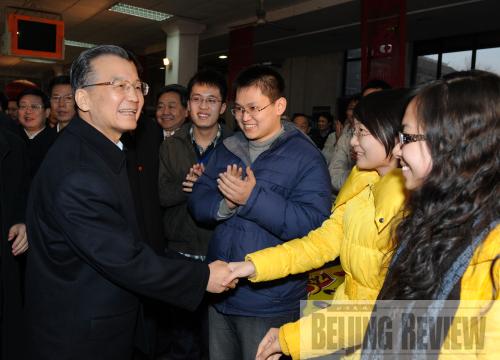|
 |
|
RETURNING TO HIS ROOTS: Chinese Premier Wen Jiabao visits Nankai University on February 16, 2009 (LI XUEREN) |
Many people immediately recall great alumni whenever the name Nankai University is uttered—former Chinese Premier Zhou Enlai, the great playwright Cao Yu, the eminent mathematician Chen Xingshen and many others.
And while October 17, 2009, may be the official 90th anniversary of this famous university, located in Tianjin Municipality, officials are already well into the party. In fact, they kicked off the celebration early this year and will keep going until 2010.
"It is better to celebrate the anniversary for the whole year rather than just one day," said Nankai University President Rao Zihe, who launched two forums during the year to celebrate Nankai's contributions—the Nankai Elites Forum and the Nankai International University Presidents' Forum. "Many big figures have been and will be invited to give lectures on campus, and it will be a great feast for the students."
The alma mater of two premiers
Premier Wen Jiabao also graduated from the university's associated Nankai Middle School, and former Foreign Minister, Qian Qichen, graduated from Nankai Primary School, which is also affiliated with the institution.
The university's motto is "dedication to the public interest, acquisition of all-around capability, and aspiring for progress each day." The first president of Nankai University, Zhang Boling, penned the motto. An officer in the waning years of the Qing Dynasty (1644-1911) who witnessed Chinese defeat at the hands of Japanese invaders in 1894, Zhang felt that only by cultivating better talent could China become strong. He became a teacher in the school of great educator Yan Xiu.
In September 1919, Zhang and Yan set up the privately owned Nankai University. They later founded Nankai Middle School and Nankai Primary School.
Nankai has experienced ups and downs together with the country. On July 29, 1937, Japanese invaders bombed the campus of Nankai. "The library and all the books in it were burned to ashes," wrote Israel Epstein, an Associated Press journalist who was an eyewitness. On July 30, Japanese troops occupied the campus and stayed there for eight years. Nankai Middle School and Nankai Primary School were both bombed to rubble as well.
In 1938, to avoid bombings by Japanese invaders, staff of Nankai and the prestigious Tsinghua and Peking universities, cooperatively formed a new institution on their way to southwest China, the National Southwest Associated University (NSAU), which was regarded as the country's best. It housed the country's leading scholars and several Nobel Prize winners. After the War of Resistance Against Japanese Aggression (1937-45) ended with victory over the Japanese, the staff of NSAU separated back into three original universities.
In 1945, Zhang organized a conference in Chongqing and advocated for China being the host of the Olympics, the first time the country took such a step.
Opening doors
On July 22, 2009, Nankai University hosted the 22nd International Young Physicists' Tournament (IYPT). It was the first time the competition, which is regarded as the physics World Cup, was held in China.
The IYPT had been unknown in China, which had not sent participants until 2008. Romano A. Rupp, head of the Applied Physics School at Nankai, introduced China to the competition. As a longtime IYPT judge, he knew that it offered exceptional training in creative thinking and working in a team to students. With his help, the China Physical Society assigned a team from Nankai University to go to South Korea in 2007 to take part in the 20th IYPT along with students from Nankai Middle School. The team scored well and also allowed China to become the host country for the 22nd IYPT.
| 
